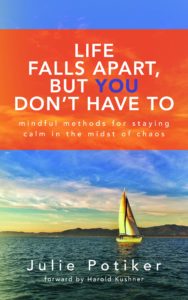You may not be able to eliminate chaos, but with mindfulness you can change your reaction to it.

Julie Potiker
Mindfulness expert and author Julie Potiker is an attorney who began her serious study and investigation of mindfulness after graduating from the Mindfulness-Based Stress Reduction program at the University of California, San Diego. She went on to train to teach Mindful Self-Compassion and completed the Positive Neuroplasticity Training Professional Course with Rick Hanson. She teaches these and other mindfulness techniques in her Mindful Methods for Life trainings and writes about them in her new book, “Life Falls Apart, but You Don’t Have To: Mindful Methods for Staying Calm in the Midst of Chaos.”
We talked to her about how mindfulness can help when you feel as if the rug’s been pulled out from under you.
Discovering a family secret related to your origin and parentage may be profoundly disorienting and disquieting. There’s so much about the experience that’s beyond your control. You may wish you’d never made this discovery, but you can’t put the genie back in the bottle. You may wish you could find your unknown parent, but it may not be possible. If you find your biological family, you may wish to be warmly welcomed by them, but if a door is closed, there may be nothing you can do to open it. You may want to discuss the revelation, but others ask you to remain silent. Can you comment on the need we often feel to control our lives and about what may be more important than controlling events?
It’s human nature to want to control events in our lives. One of my favorite quotes, attributed to the Buddha, is that “we make our own hell by wishing things were different than they are.” The only thing I know we can control is our reaction to events. By practicing a set of techniques to break the discursive loop of ruminating, we can calm down and eventually find joyful moments.
Chaos is defined as “complete disorder and confusion.” After a shocking experience that shifts people’s sense of their place in the world and within their families, they may feel that all the connections between the dots in their lives have been cut. They don’t feel anchored or centered. Why is it important to recognize that the goal isn’t to eliminate chaos, but, as the title of your book suggests, to be able to live with it?
We cannot eliminate chaos, but we can learn to deal with what life dishes out with equanimity — finding the calm in the storm.
You note in the book, “What you think changes your brain.” Can you summarize the concept of neuroplasticity and how it might be important to people who may be experiencing a storm of emotions, perhaps including anger, shame, betrayal, grief, and rejection?
Experience-dependent neuroplasticity is the concept that we can use the mind to change the brain for the better. Our thoughts and emotions fire neurons in our brains, which then fire together and form new neural circuits. What fires together wires together. Rick Hanson explains in his book “Hardwiring Happiness,” “Taking in the good is the deliberate internalization of positive experiences into implicit memory.”
It’s normal that our brains tend to hang onto negative information. That’s why noticing positive mental states when they happen (and calling up positive mental states when you need one) is so important. You are choosing to make your brain a happier place.
What is the HEAL Method?
Rick Hanson’s anagram for experience-dependent neuroplasticity:
H – Have a good experience. Be mindful so you are aware that a good experience is occurring!
E – Enrich it to install it.
A – Absorb it as if you are filling your body up with the good experience.
L – Link positive and negative material. This is an optional last step, which explains how one might supplant a bad mental state with a good mental state.
Shocking personal discoveries can feel overwhelming, becoming all one can think about. It’s not uncommon for people to focus on the past, be apprehensive about the future, and feel unable to stop intrusive negative thoughts. What’s one simple technique they can use to momentarily stop the chatter in their minds, and why is it important to do so?
You can practice mindfulness as a meditation, but you can also weave it seamlessly into your day so that you’re practicing this calming skill whether or not you have time to sit and meditate. For example:
- Practice mindfulness while brushing your teeth: This is a great place to start. Begin your mindful day as you wake up and do your morning routine. Brush your teeth mindfully by turning your full attention into each step (putting on the paste, brushing, rinsing) and each sensation (tastes, smells, and textures; the feeling of the brush). Tip: it’s easier if you close your eyes!
- Practice mindful eating: Be the observer and pay mindful attention to the way you prepare, serve, and eat your food. Slice and dice mindfully; put your fork to your mouth mindfully; taste and chew mindfully. It’s also lovely to consider the source of the particular food — where and how it was grown, the farmers who produced it, the distribution chain that allowed you to enjoy your meal. That naturally leads to a moment of gratitude.
- Practice mindful walking: You can do this mindful activity whether you’re taking a leisurely stroll at your favorite outdoor spot or hoofing it across the parking lot as you head into work. Pay attention to the soles of your feet as they meet the ground, the rhythm of your steps; your breath in and out of your nose, the feel of the air on your face, and the sights, smells, and sounds around you.
- Let music help you be in the moment: Make a playlist of songs that fill you with good feelings. You can use this playlist to boost your experience of cooking or walking or driving or anything else you can enjoy with music. (You can even just sit back and focus on the music!)
Although it’s becoming increasingly common for individuals to learn as a result of a DNA test that their family ties have unraveled, when it happens to you, you may not know anyone who’s experienced something similar. It’s an experience that can be stigmatizing and isolating. Why is it so important to nurture personal connections, even in times when you may most want to withdraw?
We primates are wired to connect. The sense of connection and common humanity helps stave off isolation, which may lead to depression. Lean in and reach out! Connection and compassion are antidotes to shame.
When stress is ongoing and unchecked, one of the consequences can be joylessness. What can be done to restore the positive emotions that stress crowds out?
Ask yourself, “What is OK right now?” Make a list of things that have been known to bring you joy, and — even if you don’t feel like it — choose one activity and do it. Notice whether any happiness is arising. You can also start a gratitude practice and pay special attention to everything in your life you are grateful for. The science behind this is solid; writing down what you are grateful for will help you to feel better. You cannot feel joyless and grateful at the same time.
How might mindfulness meditation benefit people who feel overwhelmed by the stress, and why is it important to practice regularly, even when you’re feeling better?
Mindfulness meditation gives your brain a much needed break. Meditation lowers your heart rate, blood pressure, and respiration. It decreases anxiety and depression and helps you maintain healthy habits like diet and exercise. It helps with interpersonal relationships, because you become less reactive. As your ability to pause strengthens, it enables you to choose a more skillful response in conversation with others.
What would you say to those who tell you they don’t have time or energy to meditate?
People make time for things that are important. This is a free tool that may help you live with less suffering and more ease. Shouldn’t that be enough of a motivation to try it?
What are a few of your favorite mindfulness resources, whether meditation apps or other useful tools?
I love the Insight Timer app. It’s free and it won’t get you hooked and then charge you to continue like some of the other popular apps. I love that, although there are more than 15,000 meditations on the app, it’s not overwhelming because it’s organized by how many minutes you want to spend as well as by topic category. For example, if you have six minutes and you want a meditation focused on letting go of anger, you can find it there. You can find three of my meditations here.
You describe a friend of yours who has learned to live with negative experiences as “standing in a shit storm with a fabulous umbrella.” For those who aren’t ready to cultivate a daily practice of mindfulness meditation, what are three simple techniques people can use in their daily lives to shield themselves from the storm?
- Make a joy list: Write down a list of things that bring you joy, then do one or two of those activities every day.
- Start a gratitude practice: Write down a few things you are grateful for or a few things you enjoyed each day. Write a gratitude letter to someone. Let these feelings of gratitude fill you up.
- Practice meditating: There are several great apps out there like Insight Timer to try. Even if you only have a few minutes, you can select a short meditation that works for you. Pick a time and a meditation that fits into your schedule.


